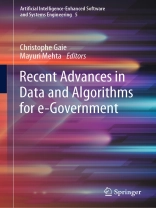This book presents new trends to optimize e-Government in various contexts. It aims to highlight new methods and approaches that unveil the potential of data for public services. The book also illustrates how public services can be mathematically modeled with many case studies. Then, algorithms are proposed to optimize their functioning and to better contribute to the general interest, such as education, health care, safety, security, or culture. The book also focuses on protecting citizens’ personal data and obtaining their explicit consent.
The book is suitable for students and academics aiming to build up their background on the usage of data and algorithms through various techniques, including artificial intelligence. The book is used as a reference book for teaching a graduate course on e-Government, Process Modeling, or Artificial Intelligence. Besides its use in academia, this book is used by civil servants of every domain and citizens who aim to understand theongoing modernization of public services.
Cuprins
Conceptual Model and Data algorithm for Modernization of E-governance towards Sustainable E-Government Services.- E-School Initiatives that Instigated the Digital Transformation of Education: A Case Study according to SABER-ICT Framework.- New Architecture to facilitate the expansion of E-Government.- Struggling against tax fraud, a holistic approach using artificial intelligence.- e-Government and Green IT: the intersection point.- Machine Learning Technique for Predicting the Rural Citizens’ Trust on using E-Governance Health Care Applications during COVID-19.- Artificial Intelligence (AI) Use for e-Governance in Agriculture: Exploring the Bioeconomy Landscape.- Enhancing government actions against Covid-19 using computer science.- From paper to digital: e-government’s evolution and pitfalls in Brazil.- The role of public libraries in improving public literacy through Twitter social media in Indonesia.












